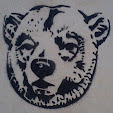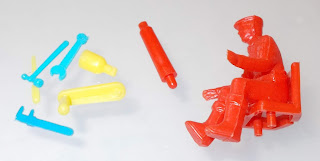'Made in France' . . . not! Lovely artwork
and who remembers when roads were often made of concrete rather than bitumen?
This is an export boxing of Rafael
Lipkin's 'Mighty Antar' heavy haulage transporter in civilian colours with
their bulldozer as a load rather than the usual conqueror tank.
Civilianised with the simple expedient of
different coloured plastic, it's all in yellow and red, however there is a more
colourful one (un-boxed and sans load) to be seen in Andrew Ralstone's plastics'
book I seem to recall, and I think he has it listed as 'unknown French'?
Unlike the military pairing (link), where
the tank is polystyrene to the transporter's polyethylene, here both vehicles
are all-ethylene, with rubber tracks, although there is variance with the
carriers wheels. They are from different production batches though, with the
road-vehicle in a washier primrose-yellow, the earth-mover a more 'solid'
shade.
As stated above, the wheels here are
different to those on my example; being thinner, hard styrene (or a Bakelite
material; it's not clear and I only handled it briefly). Otherwise this is identical
to mine and carries the full Rafael Lipkin mark on the underside of the cab.
The Bulldozer (like the tank) is unmarked.
The 'little man' is hidden by the axle, and
photographing yellow can be as problematic as red, so I've had to stop this
image down to the max, twice to get the MADE
IN ENGLAND mark and LRL-logotype
to show. I wonder if the hard-plastic wheels were produced across the channel
to justify the 'Made in France' being printed on the box?
The winding handle (yellow) has broken, and
the red thing is the exhaust-stack for the 'dozer, but of more interest in that
the tool set is in two colours, the blue being possibly the colour of the
vehicle in Ralston's book? The construction beast has a plug-in driver who may
well be languishing in your 'unknown' zone?
I didn't think to see if they are two parts
(driver and seat) but there look to be impossible undercuts for even a three or
four-part mould, so it looks like they might have been heat-joined post
manufacture?
I had previously shot this to show that the
red tank (in need of wheels) I obtained at May's show (link) is covered on the
box-art of the green tank, whether this meant there were sets with red
transporter/AFV combo's or not I don't know, but a 'dirty-commie' combination
is not beyond the imagination in the 1950/60's?
Note also that the labelling of the profile
drawing is similar to the labelling of the 'French' box's artwork; they too,
seem to have come from the same (British) printer!
The box carried a green one, and you can
tell which one is in the box from the hole seen in the previous shot, which is
punched through both side flaps and the closing-flap, to line-up and produce an
open-window . . . or 'port-hole'!











No comments:
Post a Comment